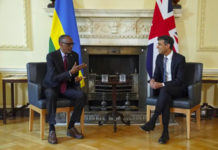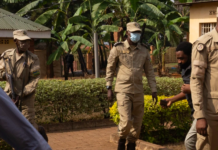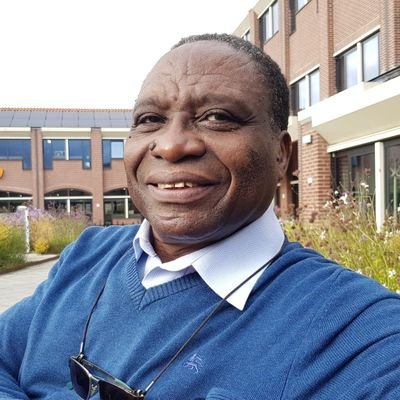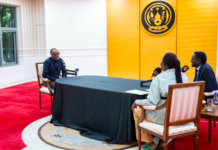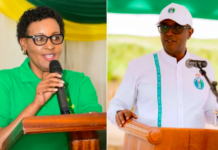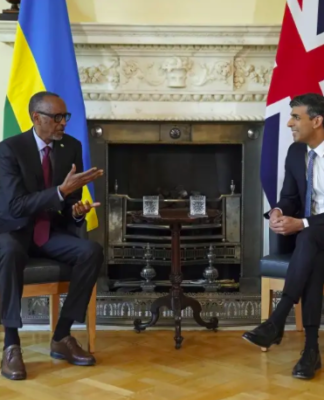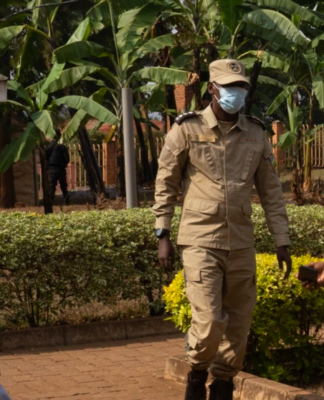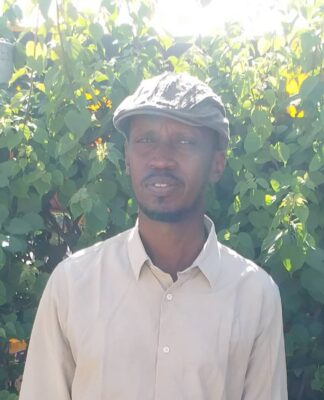I was intrigued when I realised the interest that the Rwandan regime had in Mr Charles Ndereyehe. I was particularly surprised by the quick announcement by high ranking officials and pro-government papers that he had been arrested by the Dutch government and was on his way to be deported to Rwanda. I had learnt that the Rwandan government had levelled accusations against him and that they had been dismissed by a judge as baseless. I decided to get information from the horse’s mouth and therefore went straight to Charles Ndereyehe to get his views on why the Rwanda regime would be so interested in him. I would therefore to share with other inquisitive people my findings.
Academic and Professional background
Charles Ndereyehe is a Dutch of Rwandan origin. Born on 1 October 1949 in Rwanda (Ruhengeri), he is an agricultural engineer graduated from the University of Florence in Italy (1977); he also has a degree in hydro-geology from the University of Bordeaux; a certificate from the University of Ann Arbor-Michigan-USA in rural development project management and economic development, human resources management and information technology.
Agronomist: he was head of the agricultural service of the Mutara agro-pastoral development project (Rwanda 1977-1986), director of the agricultural development project and coordinator of agricultural services in Gikongoro (Rwanda 1986-1992). He was a member of Rwanda’s National Agricultural Commission (1990-1992) and Director General of the Rwanda Agricultural Research Institute (ISAR) (1992-1994). He has written many articles on the problems of agriculture in Rwanda.
Political views and experience
Political Analyst: He followed political developments of his country of origin at a very early age. He was an attentive observer and a direct witness of political events in Rwanda between 1959 and 1994. He was president of the Rwandan Student Movement in Italy (MERI) and a member of the General Association of Rwandan Students (AGER) (1972-1977), chairman of the caucus of Progressive Rwandan Republicans and a member of the Forum for Democracy in Rwanda (1992-1994). He was the author of several articles on the reconciliation of the Rwandan people where all ethnic groups live in peace and harmony and on the prerequisites for building a rule of law in Rwanda. In his publications as well as in public conferences, he tackled head on, the Hutu-Tutsi issue that many Rwandans considered taboo at the time.
Charles Ndereyehe positions on ethnic relations and his vision for a peaceful Rwanda have been consistent and crystal clear: “Basing Rwanda politics on ethnicity is a backward enterprise only good for those without a rational national political programme and is detrimental to Rwanda’s future. A dictatorship be it led by a Hutu or a Tutsi has the same negative impact on those who are under it. The level of dictatorship and criminality are independent of ethnicity. Democracy, the rule of law and equal opportunity will make clinging to ethnic solidarity to get favour irrelevant. Therefore, suppressing ethnic sectarianism by law will not resolve the problem; government based on respect of law, genuine justice and democracy would be the real solution; political competition is the healthiest political process and no one should be imprisoned or killed for his ideas as it has often happened until now.”
He is convinced that the solution to the Rwanda crisis calls for a highly inclusive Inter-Rwandese dialogue (DIRHI) of the stakeholders of the Rwandese society in order to agree on the best way to run the country and to put in place a political system as well as constitutional and institutional arrangements that reassure and makes everybody feel secure.
He’s an active member of several platforms pleading for a Highly Inclusive Inter-Rwandan Dialogue (HIIRD) that:
- Gives voice to the oppressed people so they can decide about governance that suits them;
- Helps Rwandans establish viable democratic institutions, secure and reassuring everyone to stop the flow of refugees and various forms of rebellions arising there from;
- Finds solutions to the problem of security guarantees for a peaceful coexistence with neighboring of Rwanda, especially the Democratic Republic of Congo, because in many ways, Rwanda is at the root of crises in the region of African Great Lakes
He believes that this dialogue is the only framework conducive to building trust among ethnic groups, essential for effective reconciliation, peace and sustainable development in the Great Lakes.
He has a long experience in the politics of Rwandan refugees and was one of the key leaders who worked tirelessly to bring together various organisations of the Rwandan democratic opposition. He is currently a political advisor to the Unified Democratic Forces (FDU-Inkingi) and commissioner of the platform of the Rwandan opposition.
With regard to why the Rwanda regime was interested in him he offered the following explanation.
He first referred me to the report of the Human Rights Watch entitled “repression across borders” which explains that the Rwandan government is keen to silence any critical voices and gives lists of names of people who have murdered, escaped assassinations attempts or have been threatened.
Ndereyehe believes that he being targeted by the Rwandan regime because he has been a vocal member of the Rwandan political opposition, critical of gross violations of human rights and of the militarist approach to solving political problem that hinder peaceful return of all refugees to Rwanda.
The fact that the President of FDU-Inkingi, Ms. Victoire Ingabire Umuhoza who was living in Netherland went to Rwanda to challenge President Kagame in the 2010 Rwanda presidential elections, the Netherlands were to be considered a hotbed of opposition to the Rwandan regime. This has led to the intensification of attacks and harassments of Rwandan opponents and critics abroad from RPF regime especially in the Netherlands where Ms. Ingabire lived before return to Rwanda. Charles Ndereyehe is perceived by RPF regime as the brain behind political activism in the Netherlands. He pointed out to me that once identified as that the Rwandan regime will use any means to get rid of you by assassination, President Kagame said that “it is a matter of time and how”, and by slander under the blanket accusation of genocidaire, genocide denier, minimising genocide or espousing genocide ideology. The regime then trains false witnesses to testify against him.
It is this context that Charles Ndereyehe has been therefore falsely accused of fabricated charges including “genocide denial”, “divisionism” and “genocidal ideology”. These charges are among the most effective tools the Rwanda regime uses for silencing its critics and political opponents in Rwanda and abroad.
Other revelations likely to land Ndereyehe in trouble with the Rwandan government:
- On April 6, 2000 as chairman of the Rally for the return of Democracy and refugees (RDR), he led the delegation that went to submit ICTR General Prosecutor of ICTR Carla del Ponte at the Hague, 2000 pages report of RPF’s victims between 1990-1994.
- On 24 November 2000, a senior official of the Rwandan Government was sent to persuade him to return and take up a ministerial post, he refused.
- Being seen in the company of the people that the regime loathes most: General Kayumba Nyamwasa and Colonel Karegeya. The former has survived 3 assassination attempts and the latter was murdered New year eve 2014.
Last straw on the camel’s back: In 2003, a senior RPF’s delegate renewed the call for join the Rwandan Government otherwise to face grave consequences. This was the last straw on the camel’s back for the extremely arrogant RPF leadership,
the response was bitter. In 2004, RPF regime decided to put him on the RPF regime’s blacklist; the following year, 2005, the RPF regime issued the first arrest warrant and added his name on Interpol’s list of wanted people for genocide.
In March 2009, he was arrested in a routine highway control in Netherlands and detained. The next day, the public prosecutor inquired about his criminal file at Interpol and it turned out to be empty. Since then, the RPF has continued to fabricate false accusations against him. In July 2015, he won his case against these Rwandese Government’s false accusations.
On the 8th September 2020 he was once again arrested on basis of a new Rwandese arrest warrant. The public prosecutor released him after 16 hours of arrest. The Immigration and Naturalisation Service had misinformed the public prosecutor. Dutch nationals cannot be extradited to Rwanda.
What makes Ndereyehe keep cool and motivated despite the relentless persecution
After 25 years of fighting for Rwandan refugees, he’s pleased to see that the exiled Rwandan youth, whom he has seen grow, taking over the torch of struggle for a “democratic Rwanda”. The youth is not deterred by the intimidation, threats and false accusations by the Rwandan regime.
He is quite pleased that he is still part and parcel of political movements yearning for peaceful change which give him the opportunity to share his core values that he upholds and defends since his youth age: moral integrity, defense of democratic values, courage, social justice, living the hope that they will inspire each one and inform any future political programme for a sustainable peace, genuine reconciliation and development in Rwanda.
Charles Ndereyehe is the author of the book “My contribution to the true conquest of the sovereignty of the Rwandan people (editions scribes: 2019)” which has been translated into English “Rwanda achieving real sovereignty (editions scribes: 2019)”.
Charles Ndereyehe message to the youth.
He calls on the youth to stand out of the crowd and be counted as Rwandans who are able to transcend their ego and to discuss without fear the real political issues and their role in the future of their country and to reject and resist corruption and manipulations from autocrats and their cronies from all sides.
His dream
A Rwanda without refugees, a country where Hutus, Tutsis and Twa will live peacefully and harmoniously together. A country where his children and grandchildren will have the rights to live in without fear and a place that will welcome anyone wishing to settle there, without fear of having his/her one’s rights violated.
Jean Michel Uwamungu

